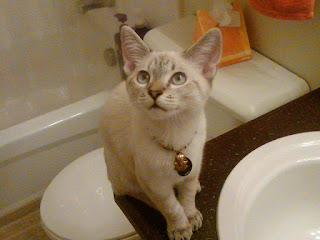One of the good rules of thumb to apply here is to think
about having a toddler around, only a toddler in miniature size – mobile,
curious but tiny! This means that you
need to consider your home in terms of potential kitty hazards before the
kitten gets too old and “into everything”.
Although there is something that you’d have to do to create a safe home
for your toddler that aren’t necessary for a kitten (such as power sockets and
drawer locks), there are a few things you should look at with a critical eye as
to whether or not they present a danger to your kitty.
If it’s hanging, or trailing, and it moves then it’s a toy
to your kitten! Make sure that you tie
up all loose wire and cables or use cable tacks and attach them firmly to walls
or along the baseboard, counter top, up desk legs, etc. so that there’s nothing
to attract your cat’s attention. If he
pulls a cable on your tea kettle, or computer keyboard, there’s a big
possibility that the item will end up on the floor and need replaced even if
the kitten is unharmed, so it makes sense to prevent this happening. Trailing plants such as ivy may also need to
be secured, although if kitty finds it, this could be just as hazardous to the
plant as the kitten!
A kitten can also easily find itself entwined in – and
possibly choke with - hanging fixings such as those on window treatments and
lamps, so tie these up out of the kitten’s way – if he doesn’t see it moving,
he won’t be attracted to it.
Like magpies, kittens are also drawn to small things that
sparkle but which can be lethal if they swallow them so put your jewelry away
in a box where he can’t see it.
Other small things such as paper clips, rubber bands, thumb
tacks, threads from a sewing box, are all possible toys that are dangerous to
you kitten so use commonsense when finding a place to store these once you have
a kitty in your home.
Although kitties can’t open bottles or containers which have
poisonous liquids in them, it is possible for them to poison themselves by
consuming toxic substances in other formats so be careful where you spray bug
spray, and cleaning materials.
This may seem like being overly cautious, but before you
switch on any appliance such as the microwave, oven, washer or dryer, make sure
that the kitten has not found its way inside!
What a kitten loves as much as his toys is warmth, and it will seek out
the warm places in your home. A quick
check will ensure a tragic accident doesn’t occur.
Kittens are tiny and fragile, and they have no concept of
danger, so limiting the number of potential hazards will create a safer
environment for your kitten to explore.
For information on safety proofing your home for a adult cat please check out...
Picture Note
Pictured above is Maahes of International House of Cats as a kitten.
All pictures are property of International House Of Cats. For all legal notices please visit our PR / Disclaimer page.
We welcome everyone from all around the world to share and post anytime on our Facebook page.
Instagram: @internationalcathouse
https://www.internationalhouseofcats.com
https://www.internationalhouseofcats.com




